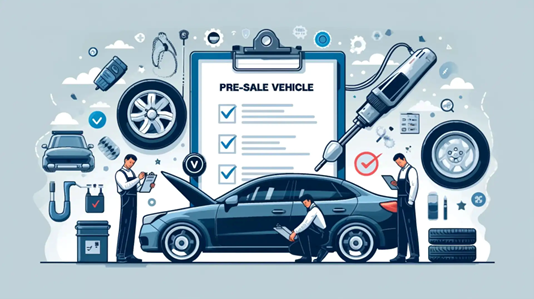Understanding Car Inspection: Importance, Process, and Benefits

Car inspection is a crucial process that ensures vehicles on the road are safe, efficient, and compliant with environmental standards. Whether mandated by law or voluntarily performed, regular car inspections are essential for vehicle owners who wish to maintain optimal performance and minimize potential hazards. This article covers the fundamentals of car inspection, including the reasons why it’s important, what the process entails, and the advantages for vehicle owners.
What Is Car Inspection?
Car inspection is a comprehensive examination of a vehicle, typically performed by certified mechanics or inspectors to evaluate the car’s roadworthiness. The inspection process usually involves a visual and functional assessment of the car’s critical systems, such as the engine, brakes, lights, tires, and exhaust. Some states or countries require annual inspections, while others may only mandate it before renewing a vehicle’s registration. Inspection requirements can vary widely, so it’s essential to understand the specific regulations in your region.
Why Car Inspection Is Important
Ensuring a vehicle is safe for the road is the primary reason for car inspections. A car in poor condition poses risks not only to the driver and passengers but also to other road users. Car inspections aim to identify and resolve potential issues before they become severe, reducing the likelihood of breakdowns or accidents. For instance, a vehicle with worn-out brakes or faulty tires is much more likely to cause an accident. Regular inspections address these issues and make the roads safer for everyone.
Another reason car inspections are critical is environmental protection. Modern car inspections often include emissions testing, designed to monitor and control the levels of pollutants emitted by the vehicle. Many regions have strict emissions regulations, and failing to meet these can lead to fines or restrictions. By keeping a vehicle in good condition, owners contribute to cleaner air and a healthier environment.
The Car Inspection Process
The car inspection process can vary depending on local requirements and the specific systems checked. However, most inspections follow a general framework, which includes:
- Exterior Examination
Inspectors begin with the car’s exterior, looking for any visible damage or issues that could affect safety. This includes checking the condition of the headlights, taillights, mirrors, windshield, and wipers. The aim is to ensure these components are functional and capable of maintaining visibility and signaling on the road. - Tire and Brake Assessment
Tires and brakes are vital to vehicle safety, as they directly affect control and stopping power. During an inspection, mechanics assess the tire tread depth and alignment, as well as the brake pads, rotors, and fluid levels. Worn-out tires or brakes can make driving dangerous, especially in adverse weather conditions, so inspectors prioritize these checks. - Engine and Transmission Check
The engine and transmission are the heart of the vehicle. A malfunctioning engine can lead to breakdowns, while transmission issues can impair the vehicle’s drivability. Inspectors check for fluid leaks, unusual noises, and signs of wear in the engine and transmission. They may also conduct emissions testing to ensure that the vehicle meets environmental standards. - Lights and Electrical Systems
Functional lighting and electrical systems are essential for road safety, allowing the driver to see clearly and communicate with other drivers. Inspectors check headlights, brake lights, turn signals, and dashboard warning lights to ensure they are working properly. - Suspension and Steering Inspection
Suspension and steering components are inspected to ensure smooth handling and control. Damaged suspension or steering parts can lead to unsafe driving conditions, so inspectors test for stability, unusual sounds, and steering response.
Benefits of Regular Car Inspection
Regular car inspections provide several advantages, both for vehicle owners and the community:
- Improved Safety
By identifying potential issues early, inspections help prevent dangerous situations on the road. Owners can address problems such as worn brakes or low tire pressure before they escalate, reducing the risk of accidents. - Enhanced Vehicle Longevity
Regular inspections ensure that all parts of the car are functioning optimally. This not only improves safety but also extends the life of the vehicle. Preventive maintenance, such as oil changes and tire rotations, discovered during inspections, can save car owners from costly repairs. - Increased Resale Value
A well-maintained vehicle with a documented inspection history often holds its value better than one without. Prospective buyers are more likely to trust a car that has been regularly inspected and maintained, which can be beneficial if you decide to sell. - Legal Compliance and Environmental Responsibility
In areas where car inspections are required, failing to comply can lead to fines and penalties. Moreover, a car that passes emissions tests contributes less to air pollution, aligning with environmental regulations and sustainability goals.
Final Thoughts
Regular car inspection are a proactive approach to vehicle maintenance, promoting safety, efficiency, and environmental responsibility. While it may seem like an added expense, the benefits of ensuring your vehicle is in top condition far outweigh the costs. Inspections catch minor issues before they become costly repairs, save on fuel by maintaining engine efficiency, and ultimately provide peace of mind for drivers.
In conclusion, car inspections are an invaluable tool for any vehicle owner. By staying on top of these checks, drivers can ensure they are doing their part in keeping the roads safe, preserving their car’s longevity, and protecting the environment.








